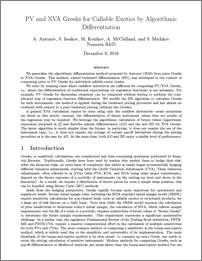
PV and XVA Greeks for Callable Exotics by Algorithmic Differentiation
We generalize the algorithmic differentiation method proposed by Antonov (2016) from price Greeks to XVA Greeks. This method, named Backward Differentiation (BD), was developed in the context of computing price or PV Greeks for individual callable exotic trades.
We start by treating cases where cashflow derivatives are sufficient for computing PV/XVA Greeks, i.e., where the differentiation of conditional expectations (or regression functions) is not necessary. For example, PV Greeks for Bermudan swaptions can be computed without having to perform the complicated step of regression function differentiation. We modify the Backward Differentiation algorithm to calculate Greeks for such instruments: the method is applied during the backward pricing procedure and has almost no overhead with respect to a pure backward pricing (without the Greeks).
A general XVA calculation cannot be done using only the cashflow derivatives - some exceptions are listed in this article - instead, the differentiation of future instrument values that are results of the regression may be required. We leverage the algorithmic calculation of future values (Algorithmic Exposures) and describe the Adjoint Differentiation (AD) and the new BD for XVA Greeks. The latter algorithm is much simpler than the former, in particular, it does require the use of the instrument tape, i.e., it does not require the storage of certain payoff derivatives during the pricing procedure as is the case for AD. At the same time, both AD and BD enjoy a similar level of performance.
Complete the form to download this research paper, “PV and XVA Greeks for Callable Exotics by Algorithmic Differentiation”
Authors: Dr. Alexandre Antonov, Dr. Michael Konikov, Dr. Serguei Issakov, Dr. Andrew McClelland, Dr.Serguei Mechkov
We generalize the algorithmic differentiation method proposed by Antonov (2016) from price Greeks to XVA Greeks. This method, named Backward Differentiation (BD), was developed in the context of computing price or PV Greeks for individual callable exotic trades.
We start by treating cases where cashflow derivatives are sufficient for computing PV/XVA Greeks, i.e., where the differentiation of conditional expectations (or regression functions) is not necessary. For example, PV Greeks for Bermudan swaptions can be computed without having to perform the complicated step of regression function differentiation. We modify the Backward Differentiation algorithm to calculate Greeks for such instruments: the method is applied during the backward pricing procedure and has almost no overhead with respect to a pure backward pricing (without the Greeks).
A general XVA calculation cannot be done using only the cashflow derivatives - some exceptions are listed in this article - instead, the differentiation of future instrument values that are results of the regression may be required. We leverage the algorithmic calculation of future values (Algorithmic Exposures) and describe the Adjoint Differentiation (AD) and the new BD for XVA Greeks. The latter algorithm is much simpler than the former, in particular, it does require the use of the instrument tape, i.e., it does not require the storage of certain payoff derivatives during the pricing procedure as is the case for AD. At the same time, both AD and BD enjoy a similar level of performance.
Complete the form to download this research paper, “PV and XVA Greeks for Callable Exotics by Algorithmic Differentiation”
Authors: Dr. Alexandre Antonov, Dr. Michael Konikov, Dr. Serguei Issakov, Dr. Andrew McClelland, Dr.Serguei Mechkov
Authors

Serguei Issakov, Ph.D.
Dr. Issakov, as Chief Quantitative Officer and Senior Vice President of Global Quantitative Research and Development, oversees the company’s quantitative research globally, including the research of pricing models at Numerix. Since joining Numerix in 1999, his earlier roles at Numerix included Vice President of Financial Applications, Head of Engine Development (the forerunner to Numerix 7) and Head of Risk Analytics.
Prior to joining Numerix, Dr. Issakov held research positions in theoretical physics at the Nordic Institute for Theoretical Physics in Copenhagen, the University of Paris (Laboratory of Theoretical Physics and Statistical Models), the University of Oslo and the Center for Advanced Study in Oslo. Before that, he led research on models of brain rhythms at the Medical Radiological Center in Obninsk Russia.
Dr. Issakov has published over 40 papers in mathematics and theoretical physics. He is a co-author of the Issakov-Ouvry-Wu equations in fundamental quantum statistical mechanics. He has received numerous fellowships and research grants, including a NATO Visiting Professorship and grants from the Russian Foundation for Basic Research. He holds PhD in Theoretical and Mathematical Physics from Moscow Institute of Physics and Technology, from the Theory Group led by Physics Nobel Laureate Vitaly Ginzburg.

Dr. Alexandre Antonov
Dr. Antonov received his PhD degree from the Landau Institute for Theoretical Physics in 1997 and joined Numerix in 1998, where he currently works as a Senior Vice President of Quantitative Research. His activity is concentrated on modeling and numerical methods for interest rates, cross currency, hybrid, credit and CVA. Dr. Antonov is a published author for multiple publications in mathematical finance, including RISK magazine and a frequent speaker at financial conferences.

Dr. Michael Konikov
Dr. Michael Konikov is a Senior Vice President and Head of Quantitative Development at Numerix, where he manages a team responsible for the development and delivery of models in Numerix software. Previously, he worked at Citigroup, Barclays, and Bloomberg in quantitative research and desk quant roles. He completed his PhD in mathematical finance at the University of Maryland College Park, concentrating in particular on the application of pure jump processes to option pricing. Dr. Konikov's publications cover diverse asset classes ranging from equity to interest rates and credit.

Andrew McClelland, Ph.D.
Andrew McClelland’s quantitative research at Numerix focuses on XVA pricing and hedging, generating counterparty credit risk metrics for structured products, and estimating risk model parameters via time-series estimation. He earned his PhD in finance at the Queensland University of Technology for a thesis on financial econometrics. He considered markets exhibiting crash feedback, option pricing for such markets, and parameter estimation for such markets using particle filtering methods. Dr. McClelland’s work has been published in the Journal of Banking and Finance, the Journal of Econometrics, and the Journal of Business and Economic Statistics.


